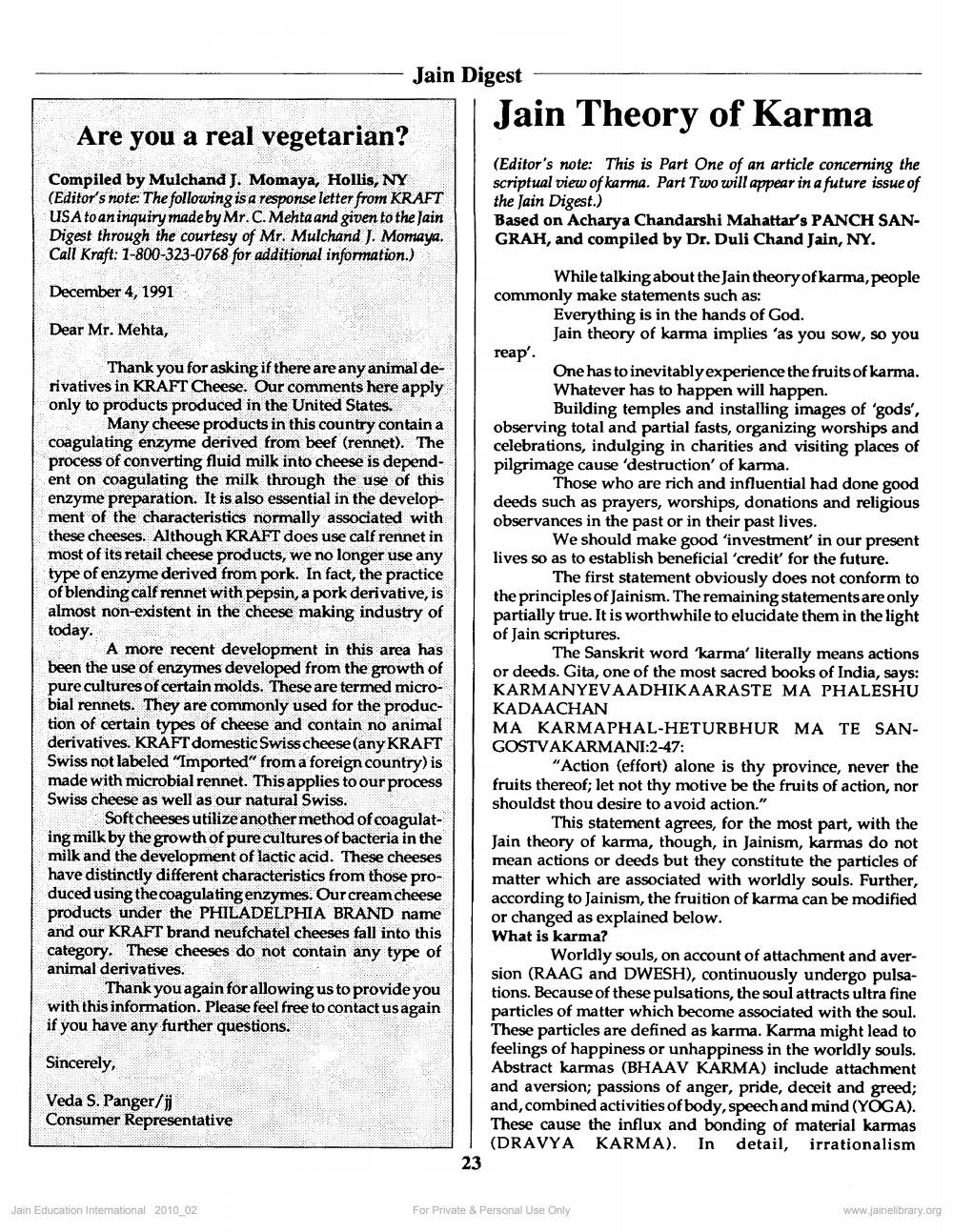________________ - Jain Digest Jain Theory of Karma Are you a real vegetarian? (Editor's note: This is Part One of an article concerning the Compiled by Mulchand J. Momaya, Hollis, NY scriptual view of karma. Part Two will appear in a future issue of (Editor's note: The following is a response letter from KRAFT the Jain Digest.) USA toaninquiry madeby Mr. C. Mehta and given to the Jain Based on Acharya Chandarshi Mahattar's PANCH SANDigest through the courtesy of Mr. Mulchand J. Momaya. GRAH, and compiled by Dr. Duli Chand Jain, NY. Call Kraft: 1-800-323-0768 for additional information.) While talking about the Jain theory of karma, people December 4, 1991 commonly make statements such as: Everything is in the hands of God. Dear Mr. Mehta, Jain theory of karma implies 'as you sow, so you reap'. Thank you for asking if there are any animal de One has to inevitably experience the fruits of karma. rivatives in KRAFT Cheese. Our comments here apply Whatever has to happen will happen. only to products produced in the United States. Building temples and installing images of 'gods', Many cheese products in this country contain a observing total and partial fasts, organizing worships and coagulating enzyme derived from beef (rennet). The celebrations, indulging in charities and visiting places of process of converting fluid milk into cheese is depend. pilgrimage cause 'destruction' of karma. ent on coagulating the milk through the use of this Those who are rich and influential had done good enzyme preparation. It is also essential in the develop deeds such as prayers, worships, donations and religious ment of the characteristics normally associated with observances in the past or in their past lives. these cheeses. Although KRAFT does use calf rennet in We should make good 'investment' in our present most of its retail cheese products, we no longer use any lives so as to establish beneficial 'credit for the future. type of enzyme derived from pork. In fact, the practice The first statement obviously does not conform to of blending calf rennet with pepsin, a pork derivative, is the principles of Jainism. The remaining statements are only almost non-existent in the cheese making industry of partially true. It is worthwhile to elucidate them in the light today. of Jain scriptures. A more recent development in this area has The Sanskrit word 'karma' literally means actions been the use of enzymes developed from the growth of or deeds. Gita, one of the most sacred books of India, says: pure cultures of certain molds. These are termed micro KARMANYEVAADHIKAARASTE MA PHALESHU bial rennets. They are commonly used for the produc KADAACHAN tion of certain types of cheese and contain no animal MA KARMAPHAL-HETURBHUR MA TE SANderivatives. KRAFT domestic Swiss cheese (any KRAFT GOSTVAKARMANI:2-47: Swiss not labeled "Imported" from a foreign country) is "Action (effort) alone is thy province, never the made with microbial rennet. This applies to our process fruits thereof; let not thy motive be the fruits of action, nor Swiss cheese as well as our natural Swiss. shouldst thou desire to avoid action." Soft cheeses utilize another method of coagulat This statement agrees, for the most part, with the ing milk by the growth of pure cultures of bacteria in the Jain theory of karma, though, in Jainism, karmas do not milk and the development of lactic acid. These cheeses mean actions or deeds but they constitute the particles of have distinctly different characteristics from those pro matter which are associated with worldly souls. Further, duced using the coagulating enzymes. Our cream cheese according to Jainism, the fruition of karma can be modified products under the PHILADELPHIA BRAND name or changed as explained below. and our KRAFT brand neufchatel cheeses fall into this What is karma? category. These cheeses do not contain any type of Worldly souls, on account of attachment and averanimal derivatives. sion (RAAG and DWESH), continuously undergo pulsaThank you again for allowing us to provide you tions. Because of these pulsations, the soul attracts ultra fine with this information. Please feel free to contact us again particles of matter which become associated with the soul. if you have any further questions. These particles are defined as karma. Karma might lead to feelings of happiness or unhappiness in the worldly souls. Sincerely, Abstract karmas (BHAAV KARMA) include attachment and aversion; passions of anger, pride, deceit and greed; Veda S. Panger/j and, combined activities of body, speech and mind (YOGA). Consumer Representative These cause the influx and bonding of material karmas (DRAVYA KARMA). In detail, irrationalism 23 Jain Education International 2010_02 For Private & Personal Use Only www.jainelibrary.org




